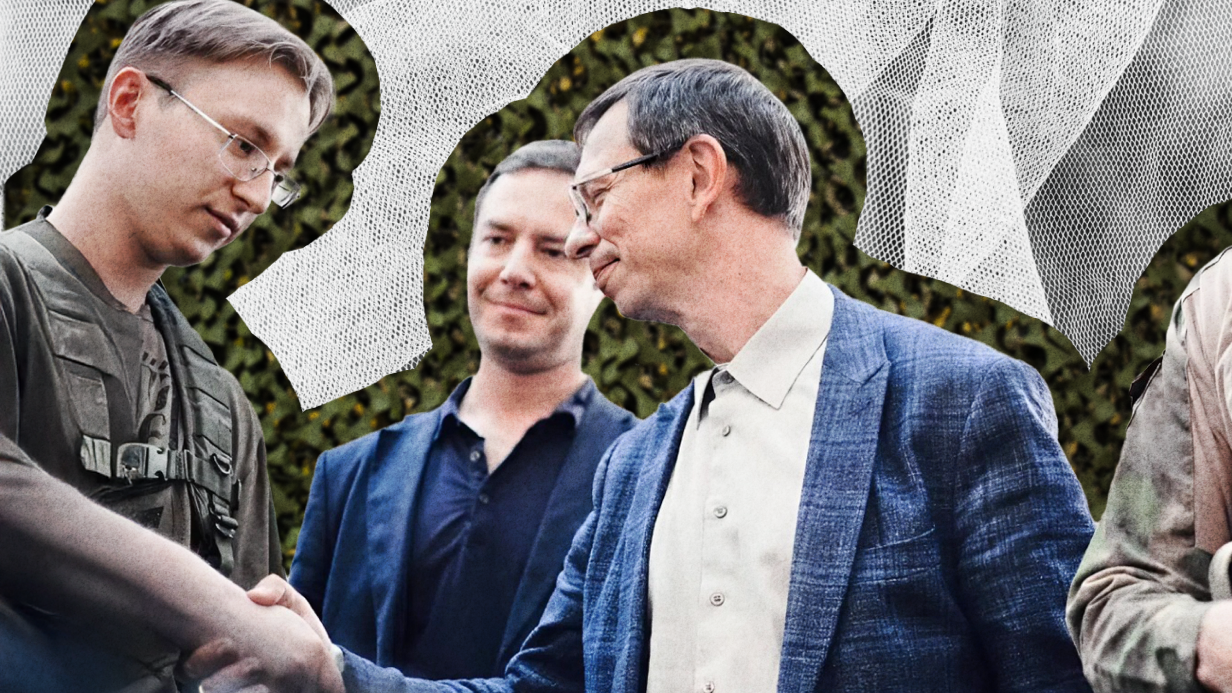
Over the past three and a half years of active sanctions policy, only four rectors of Russian universities have been added to Western “blacklists.” The most prominent among them is Nikita Anisimov, only the second rector in the history of the Higher School of Economics (HSE). T-invariant reports on how, under his leadership, HSE has once again outpaced all other universities, but this time — in militarization, promotion of the pro-war ‘Z’ ideology, participation in the Kremlin’s propaganda machine, and direct involvement — by Anisimov himself, his team, and even students — on the front lines and in occupied territories.
Top stories on scientists’ work and experiences during the war, along with videos and infographics — subscribe to the T-invariant Telegram channel to stay updated.
Nikita Anisimov became the third sitting rector of a Russian university to be targeted by personal Western sanctions. The first was Vladimir Litvinenko, rector of St. Petersburg Mining University, who was placed under US sanctions in May 2023. However, he was included primarily as a billionaire, and the academic supervisor of Vladimir Putin’s dissertation, and the head of his election campaigns in St. Petersburg. The second was MGIMO rector Anatoly Torkunov, added to Canada’s lists in September 2023. Also listed in the sanctions lists of several countries is a corresponding member of the Russian Academy of Sciences Vladimir Bespalov, the current head of the Russian Science Foundation, who until 2024 led the Moscow Institute of Electronic Technology (MIET). However, Anisimov was explicitly “singled out” for his active role as HSE rector in connection with Russia’s military aggression against Ukraine, with detailed accounts of his involvement.
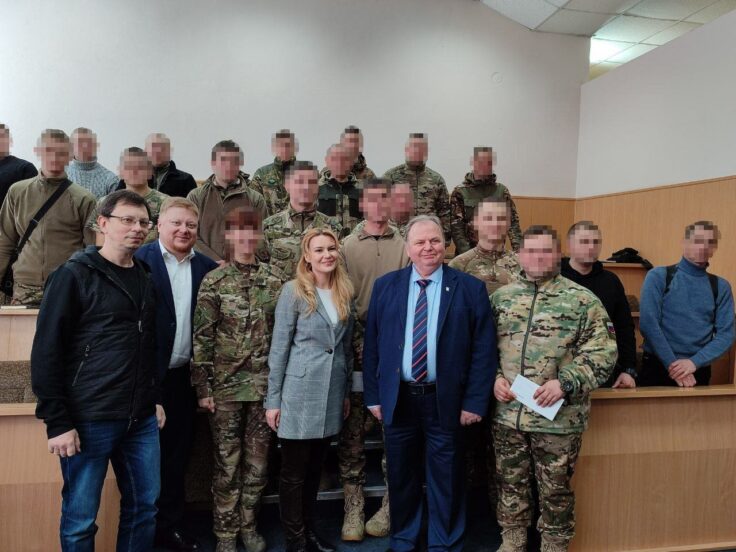
The EU document explains his inclusion for several reasons. In March 2022, Anisimov publicly supported Russia’s military aggression against Ukraine by signing an appeal from the Russian Union of Rectors. In May 2023, he announced that HSE would finance education in core degree programs for participants of the “special military operation,” their children, and close relatives. In November 2022, Anisimov was awarded the Russian Ministry of Defense medal “For Strengthening Military Cooperation.” In 2023, the rector visited universities in occupied Ukrainian cities — Donetsk and Luhansk. And in 2025, HSE launched a new master’s program focused on circumventing international sanctions — thereby supporting the Russian government and facilitating such circumvention. EU officials concluded that Nikita Anisimov “supports actions and policies that undermine the territorial integrity, sovereignty, and independence of Ukraine.”
PREVIOUSLY IN T-INVARIANT
From Import Substitution to Import Circumvention: Russian universities have mass-launched programs on sanctions compliance
Journalism departments hit by “storm Z”: military officers and former prisoners joined in teaching students
Canceling Yasin: Why HSE is Methodically Abandoning the Legacy of Its Founder (in Russian)
Andrei Yakovlev: “Through the FSB, HSE was transferred from the economic security service to the service for the protection of the constitutional order and the fight against terrorism”
“This is an unpleasant blow to the reputation of HSE as one of the world’s renowned Russian scientific centers, primarily in the social sciences. Essentially, from its very beginning, the university positioned itself as an open and forward-looking institution, a think tank in a number of scientific fields. Numerous international connections, invitations to very prominent scientists and politicians — all this is the result of years of painstaking work. Sanctions restrict HSE’s capabilities in this area, but it would be naive to assume that if sanctions target the entire state, an individual university could remain unaffected,” says a Russian teacher who spoke with T-invariant on condition of anonymity.
Economist Igor Lipsits, one of HSE’s founding figures, believes that Anisimov’s addition to the sanctions lists will no longer affect the university.
“It won’t have any impact — the very idea of HSE as a university aspiring to join the academic community of developed nations is already ‘dead and buried’. Now they will pretend to strengthen ties with universities of the Global South,” Lipsits explains.
In his opinion, this is more of a “symptom of the EU’s changing attitude toward Russia”: “From the position of ‘The people are good, but the president is a criminal’ to the position of ‘Russia is a country where people support the war.’ Accordingly, in the future, this will greatly complicate the reintegration of Russia as a state, and of its citizens, into normal relations with the EU. Germany and the Germans had to extricate themselves from a similar situation after World War II over decades and through a formal process of ‘repentance.’ In Russia, this is unlikely. Accordingly, the rupture and isolation will be longer and more difficult to overcome.”
The aspect that drew the most attention in the Western press regarding Anisimov’s inclusion in the EU “blacklists” was the creation of a “master’s program dedicated to circumventing international sanctions” at the university. Recall that T-invariant first reported in detail on this program and three similar ones at HSE, which train specialists in sanctions compliance, in its investigation From Import Substitution to Sanctions Evasion. HSE has always had a keen sense of market demand, was the first to respond to the current situation and became the clear leader in this area.
All the reasons cited by EU officials for including Anisimov in the sanctions lists are widely known: T-invariant, among others, has been consistently reporting on them. However, the list of the rector’s “achievements” goes even further.
Anisimov and his team are actively engaged in militarizing HSE students, and thanks to a well-resourced PR department, all Z-initiatives — both personal and collective — are vigorously promoted in the media, among military correspondents, and leading Z-propagandists. The Faculty of Creative Industries at HSE — one of the university’s largest educational divisions — has effectively become an important element of the Russian Federation’s propaganda machine. T-invariant reports on how Nikita Anisimov became a top Z-rector, reoriented the work of the entire university toward this ideological goal, and how the Kremlin rewards him for it.
“Anisimov is an empty figure; his official position (and, accordingly, his hefty salary as rector of HSE) is ensured solely by his activism in promoting Russia’s militarization. So he’s trying hard,” asserts Igor Lipsits.
“Anisimov was not an independent figure when he was appointed rector of HSE (precisely why he was the best candidate for the position at that time). Then he became even more dependent on the leadership of the 2nd Service of the Russian FSB — the Service for the Protection of the Constitutional Order and Combating Terrorism. It was this service that began overseeing HSE in the late 2010s, it approved Anisimov’s candidacy for the rectorship in June 2021, and it is with this Service that Anisimov constantly coordinates all significant dismissals and appointments within the university. In this sense, the public pro-war activity of the rector and the university is a direct order from the 2nd Service, which thereby signals upwards that HSE is under control,” said one of HSE’s longtime administrators in a conversation with T-invariant.
Nikita Anisimov and the DJI Mavic
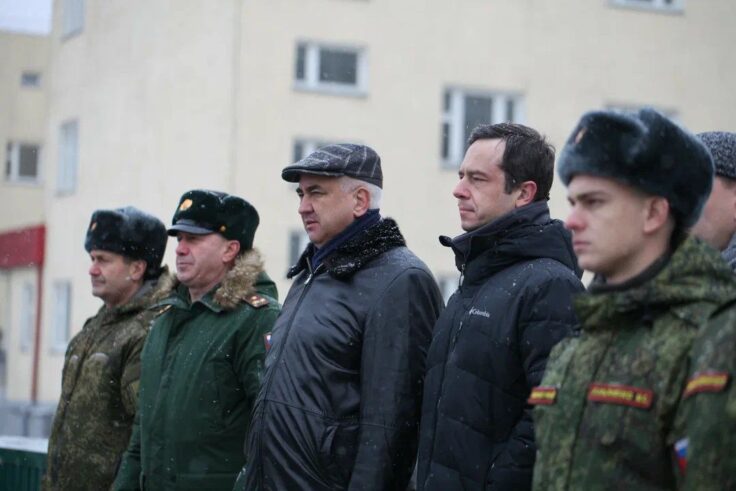
As early as 2022, HSE’s leadership began supporting Russia’s military aggression against Ukraine not just in words, but in deeds. And while other universities were collecting humanitarian aid, and more proactive ones were weaving camouflage nets, HSE twice publicly reported transferring UAVs to the front — the photo from the ceremonial handover shows Vice-Rector for Extracurricular Work Dmitry Zemtsov and the Director of the Military Training Center — who together delivered eight drones to two military units, costing at least 4 million rubles (about $40,000). At the time of the collection, one DJI Mavic 3 model costs approximately 420 thousand rubles. The package also included Poco M5 smartphones used to control the drones, weapon accessories, and other equipment.
As the student publication The Vyshka reported at the time, the campaign triggered a wave of complaints to the “Expressive Button” — a student hotline at HSE”. In response to students’ questions about the permissibility of the action, responses explained that the event was organized with the support of anonymous donors and the Military Training Center (no public fundraising was announced at the time).
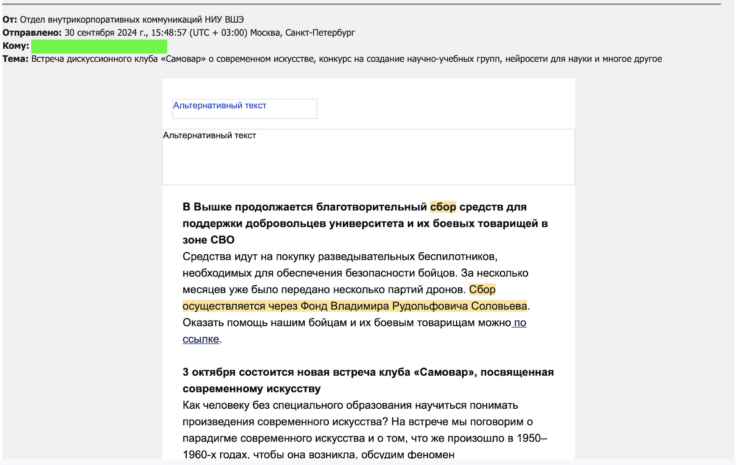
However, later HSE stopped being discreet and institutionalized staff fundraising for the purchase of combat drones. The administration began sending emails to all staff urging them to donate to a fund run by propagandist Vladimir Solovyov, and even publicized it on the university’s official channels.
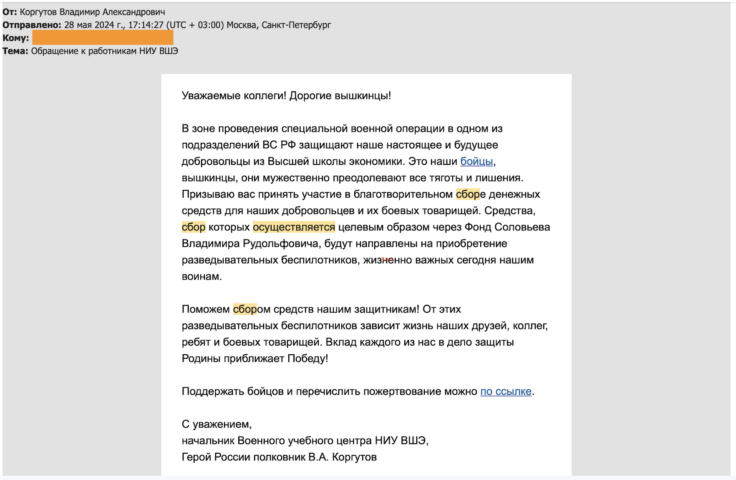
Letters began to be sent out regularly. The PR service reported matter-of-factly in 2024: “The funds are used to purchase reconnaissance drones needed to ensure the safety of soldiers. Over several months, several batches of drones have already been transferred. For instance, on May 9, two drones were sent — a DJI Mavic 3 and a DJI Mavic 3T. On July 15, six drones were delivered to the fighters: three DJI Mavic Pro and three DJI Mavic Classic, plus four batteries. And on August 20, a DJI Mavic 3T, a DJI Mavic Classic, and two batteries were handed over.” A separate landing page for the collaboration between HSE and Vladimir Solovyov was launched, and Nikita Anisimov himself has spoken about it numerous times in various interviews (1, 2, 3).
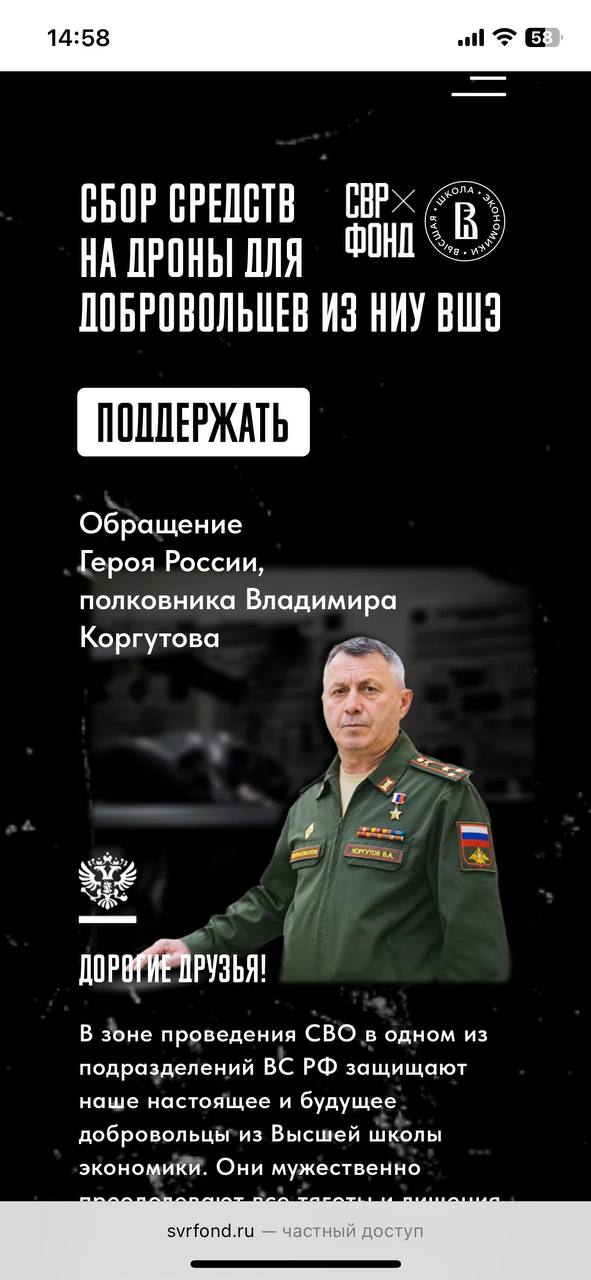
The initiative was also taken up by the official HSE student Z-organization White Raven. They began organizing regular fundraisers for UAVs and, at times, for Starlink systems. At a university-wide student festival, they performed on a makeshift armored van, covered with Z-symbols and stickers depicting the so-called “polite people” — soldiers without insignia who seized Crimea. Nikita Anisimov happily posed for photos with them. At some point, a final warning was sent to HSE youth who criticized this Z-themed activity: one female student, who left a comment on the White Raven pages, was fined for allegedly “discrediting” the army. It was the “white ravens” who represented HSE students at the St. Petersburg International Economic Forum — in a session titled “Reassembling Ukraine: Demilitarization and Denazification”.
Nikita Anisimov and the Propaganda Department
In 2022, the Department of Media — part of the Faculty of Creative Industries — underwent a dramatic transformation under the leadership of prominent Russian propagandist Ernest Mackevičius. Mackevičius runs the large department while retaining his main job as the longtime host of the flagship news program Vesti on RTR, where he has worked for over 20 years and is regularly tasked with special propaganda assignments (it was Mackevičius who recently moderated a conversation with Mikhail Kovalchuk about how Western elites allegedly use LGBT and child-free ideologies and even biological weapons to undermine humanity and threaten Russia). The actual academic programs in media and journalism are overseen by Mackevičius’s deputy, Eduard Bondarenko, with a decade of experience in the Russian Ministry of Internal Affairs. “A textbook commissar — a true ‘comrade major,’” is how a veteran of the media department described his working style in a comment to T-invariant. The faculty’s team is headed by Andrey Bystritskiy (Chairman of the Valdai International Discussion Club, included on Western sanctions lists), his deputy is Oleg Solodukhin (who stepped down to make way for Mackevičius), and the head of the School of Communications (essentially PR) is Sergey Zverev (founder and president of the KROS Group, a leading PR firm frequently contracted by Russian authorities; Solodukhin is vice-president of KROS). For a detailed account of how HSE’s most liberal faculty under Anisimov became its most pro-Kremlin one, see the Groza media article. Mackevičius himself summed up this transformation in 2025 at yet another patriotic forum, when he proposed, as Groza writes, “using HSE’s model to reform the country’s media education system — bringing in military correspondents to instill ‘the right values’ in students.”
Up-to-date videos on science during wartime, interviews, podcasts, and streams with prominent scientists — subscribe to the T-invariant YouTube channel!
Maryana Naumova was the first ‘voenkor’ (pro-war correspondent-propagandist) — to meet with journalism students, in May 2024 (T-invariant described this meeting in the article Journalism departments hit by “Z Storm”). Later military correspondents became regular guests in the media department. Last summer, Mackevičius, along with a number of other leading propagandists, created a scholarship for journalism students in honor of Rostislav Zhuravlev — a voenkor who fought with Interbrigades since 2014 and was later killed in action. Then he held a conference on war journalism in Luhansk (HSE was a co-organizer), and by this academic year, voenkor Yevgeny Poddubny joined the academic council of the “Journalism” program at HSE. However, other university figures also organize meetings with military correspondents and pro-war ‘Z’ personalities. For instance, the White Raven invited militant and voenkor Vladlen Tatarsky, who was later killed in a St. Petersburg café bombing during a meeting with supporters, and several other active combat participants and well-known Z-activists to the university.
Nikita Anisimov and Profiling
And finally, the third area HSE began actively focusing on from 2022 is competing in the same propaganda space as another major Z-influencer — former Russian president Dmitry Medvedev. A member of the HSE Academic Council, Sergey Karaganov, began openly threatening the West with nuclear annihilation. In 2023, he published an article titled Using Nuclear Weapons Could Save Humanity from a Global Catastrophe that urged the Kremlin to “carry out a preemptive nuclear strike on Europe.” In 2024, he in co-authorship with Admiral Sergey Avakyants, former Commander-in-Chief of the Pacific Fleet, turned those threats into a book titled From Deterrence to Intimidation. The essence of the book can be summarized as follows: Russia’s full-scale invasion of Ukraine showed that “not everything in Russia’s nuclear deterrence policy had an impact on Western — primarily American — elites.” Therefore, according to Karaganov and colleagues, to increase the effectiveness of this deterrence and prevent a catastrophic war, the elements of nuclear intimidation should be made more explicit and forceful.
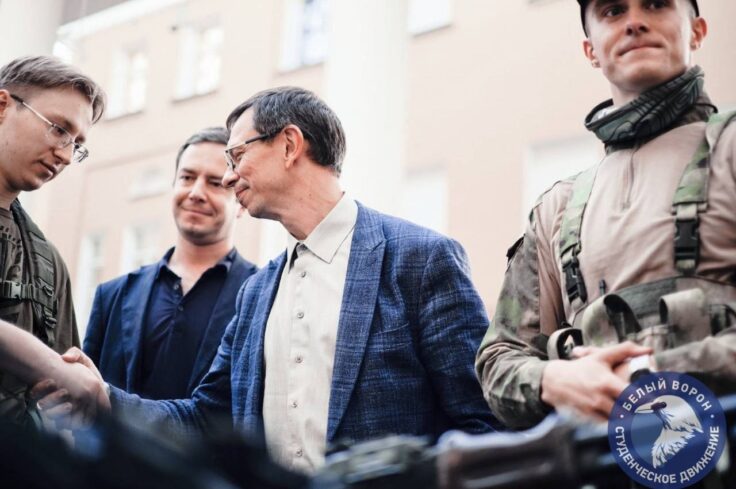
Even as the West remains intact, HSE began teaching students how to ‘read’ the true intentions of Western political leaders. At the same “Karaganov” Faculty of World Economy and International Affairs, Maria Butina began teaching “Political Profiling” (in 2018, a US court sentenced her to 18 months in prison on charges of acting as an agent against the US under a plea deal). Political profiling is widely regarded as a pseudoscientific, but Nikita Anisimov sees nothing wrong with this method. In an interview with Regnum, he says that “profiling is normal practice in the intelligence services of a number of states. This existed even before any AI, when one person simply assessed another person to understand how they would react in a specific situation.” Western intelligence agencies are also seeking HSE’s research, which is why many works are no longer published openly, he explains. “We know which states are unfriendly toward Russia. They have specialists who study other states, how their education system is structured, in order to infiltrate and influence it,” the rector explains.
Igor Lipsits, upon announcing his dismissal from HSE, stated that “in a short period, HSE has turned into a remarkably silent university” (where, meanwhile, professors who publicly call for nuclear strikes on Europe continue teaching without consequence). Another key HSE founder, Andrey Yakovlev, offered a different assessment in 2023 under similar circumstances offered a different assessment of the university’s changes: “In terms of the composition of the teaching staff and their academic level, HSE stood out sharply against the general backdrop. But now it has become similar to an ordinary Russian university.”
“It’s important for everyone who is so upset by the changed situation at HSE in recent years to remember that this university is subordinate to the state, the government of the Russian Federation. It’s impossible that the country’s policy has one set of guidelines, and the university’s policy has another. University autonomy in Russia is more an idea than a reality, and in recent years it has eroded significantly. Therefore, a university like HSE is part of the overall state policy, and no other way is possible today. Another matter is to decide whether you will be in the front ranks or follow in the wake of others who are more proactive in this field. But from its inception, HSE sought to be among the leaders and to set the benchmarks. It’s just that these are the benchmarks now — this is what state policy demands today,” the professor believes.
Nikita Anisimov and Questions of Maturation
In the aforementioned Regnum interview, the interviewer asks Nikita Anisimov four times, in different ways, why HSE, of all places, earned the label of a “hotbed of liberal values” and what has become of that label now. Unable to dodge the question, Anisimov reduces it to the costs of growing up — for both Russian society and HSE. Here is an excerpt.
Marina Akhmedova: Still, why did HSE in particular get such an image?
Nikita Anisimov: It’s a question of age. Parents understand perfectly well that when children are growing up, they sometimes try to attract attention through hooligan behavior. It’s much the same with HSE… Russia adopted a national security strategy that clearly reflected society’s demand for a return to traditional values, to justice, and to greater state involvement in strengthening the family. And before that time, the university’s image was largely dictated by a desire to please the society we had.
Anisimov then claims that Russia — together with HSE — has evolved from a “hooligan state” into a “state-civilization.”
“The current spirit of the age is supra-civilizational. We are living in a time when many distinct civilizations coexist in the world, and Russia is not an element of any of them, but is itself a distinctive, independent civilization, having the right to its own perspective and a place in that supra-civilizational dialogue.
And since universities are aligned with today’s supra-civilizational logic, with the fact that Russia is forming as a separate civilization, the current generation shaped by the intellectual forces of the university, is a generation that will live in the Russia of the future — in a state-civilization.”
Thus, in an unusually candid interview, Anisimov himself corroborated the assessments of former and current HSE staff (Lipsits, Yakovlev, and other T-invariant sources who requested anonymity). A once “hooligan university” that skipped several stages of development over its thirty-year history — surpassing Russia’s classical universities by many measures — has in recent years turned into an ordinary Russian institution, where professors now compose nonconvertible mythologemes about a “state-civilization” — ideas worthless outside Russia — and, at the Kremlin’s behest, churn out a steady stream of “scientific works” about brandishing the nuclear stick at the West.